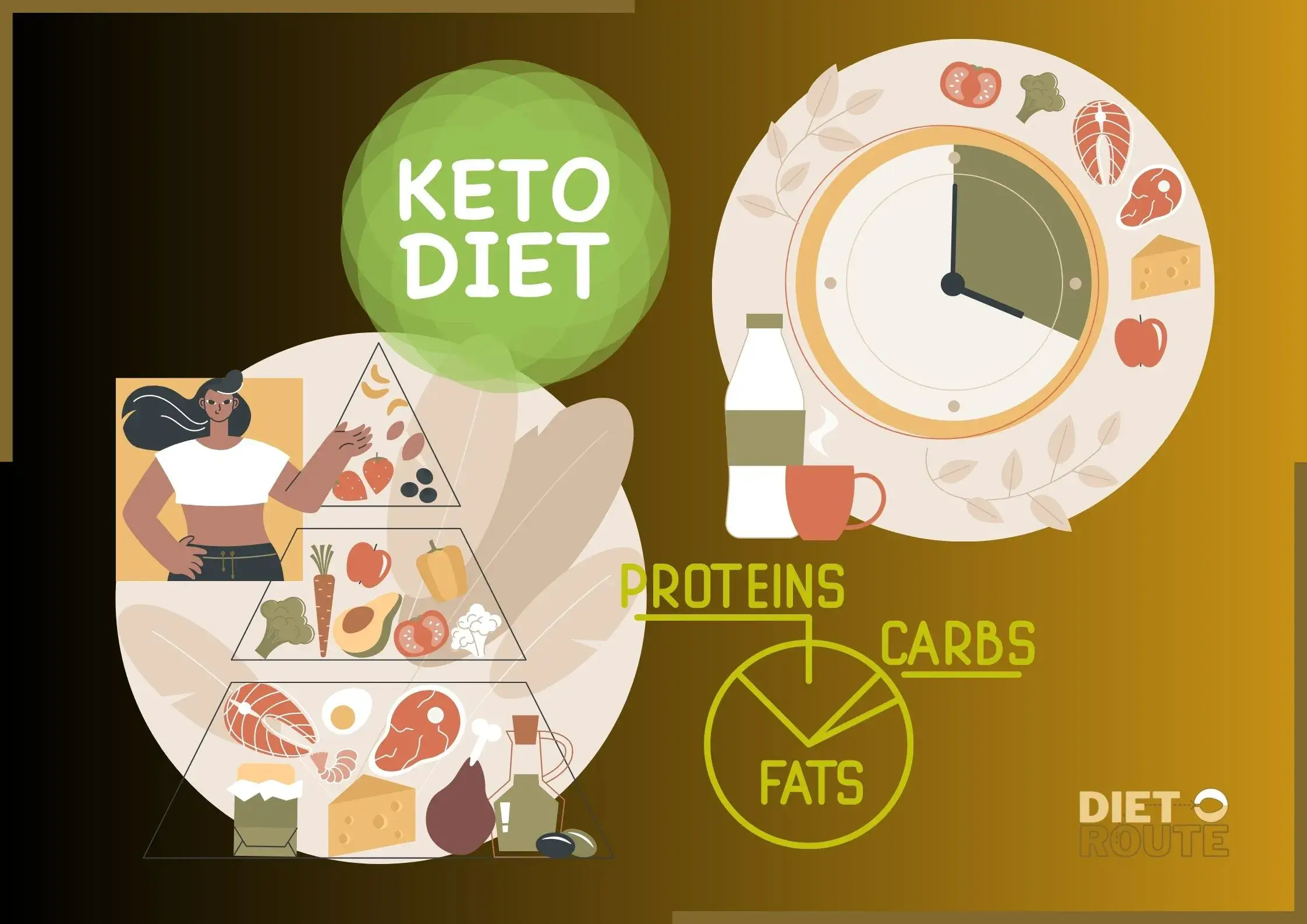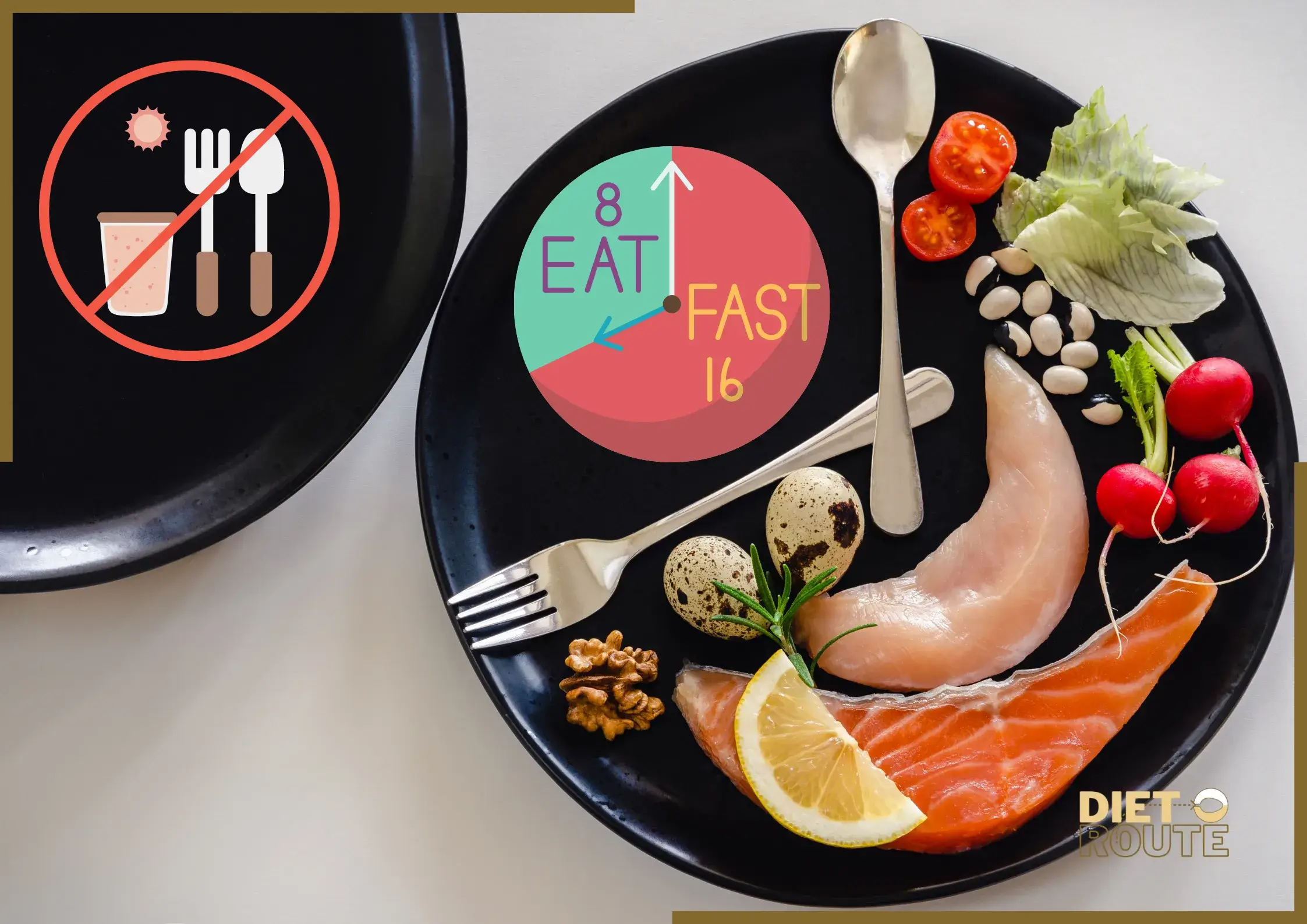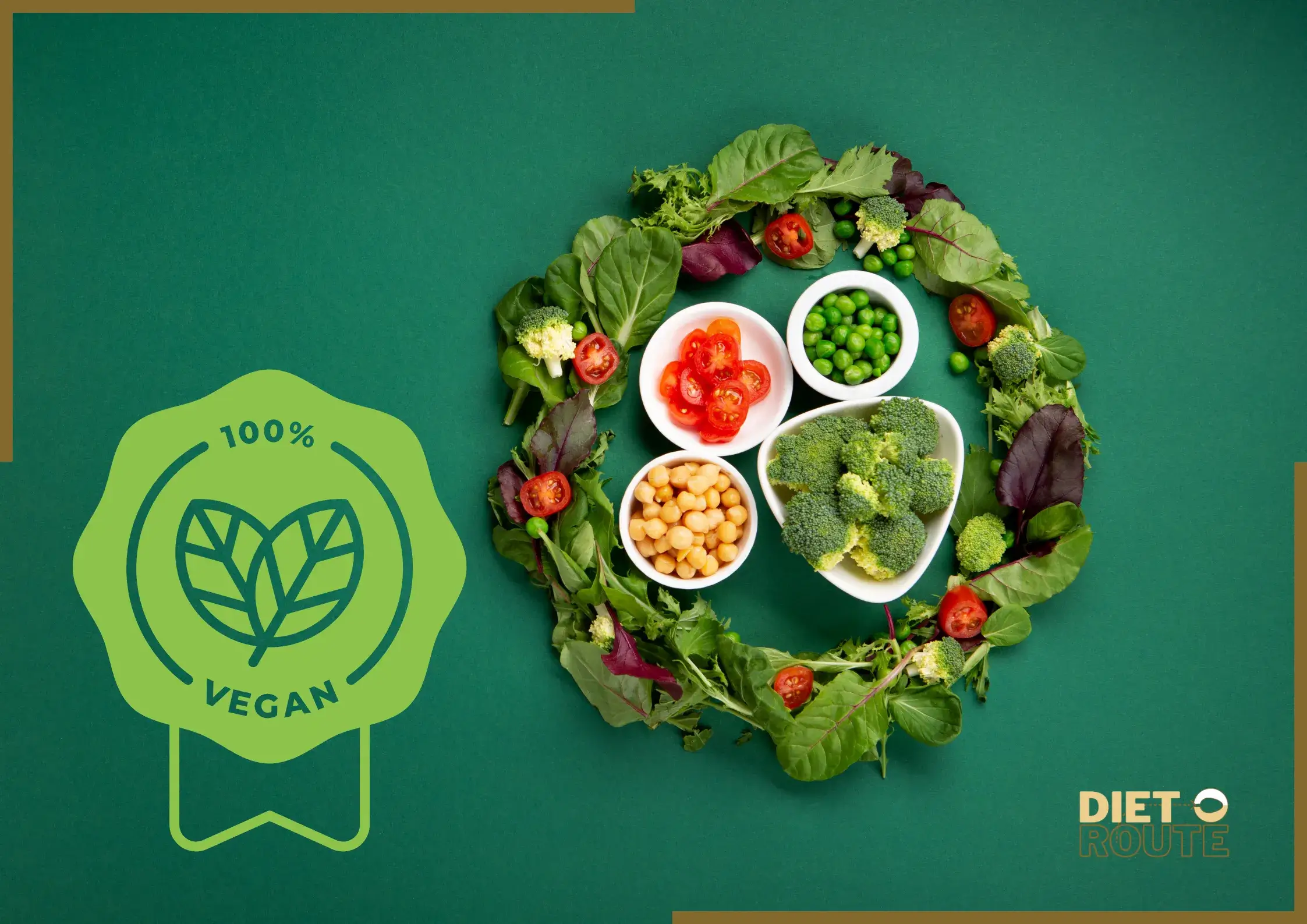“The ketogenic diet is effective because it encourages your body to use fat as fuel.” – Diet Route
Table of Contents
Introduction
Welcome to the definitive reference to the ketogenic diet, a very effective strategy for improving both weight loss and general health. The ketogenic diet has become quite popular due to its promising results, whether you’re trying to lose those stubborn pounds, increase your energy, or improve your mental clarity.
In this in-depth guide, we’ll examine the fundamental tenets of the ketogenic diet, go through its advantages, and provide you with expert-backed keto diet tips to guarantee your success on this life-changing journey. Prepare to start your journey to a better, happier you. Let’s start now!
Knowledge of the Ketogenic Diet
Before delving into the specifics of the ketogenic diet, it’s crucial to understand the underlying ideas that guide this revolutionary way of eating. The ketogenic diet, sometimes known as the “keto diet,” is a low-carb, high-fat eating plan that tries to make fats your body’s main fuel source instead of carbs.
Significantly reducing your glucose intake while significantly increasing your fat consumption will induce a metabolic state known as ketosis.
When you enter ketosis, your body switches from using glucose, which it gets from carbohydrates, to using ketones, which it gets from breaking down fat. This metabolic flip not only encourages effective fat burning but also has a number of additional potential advantages, such as weight loss, an increase in satiety, better mental clarity, and blood sugar stabilisation.
It is normally advised to keep your daily carbohydrate intake to 20 to 50 grammes while making sure that the bulk of your calories come from healthy fats in order to enter and stay in ketosis. Avocados, nuts and seeds, olive oil, coconut oil, fatty fish, and grass-fed meats are a few examples of such foods.
It’s important to remember that protein intake needs to be controlled since too much protein can prevent the body from entering ketosis by turning into glucose through a process called gluconeogenesis.
Understanding the fundamentals of the ketogenic diet will help you make wise decisions and increase your chances of success on this life-changing journey. Let’s now examine the many advantages that the keto diet has to offer.
The Advantages of the Keto Diet
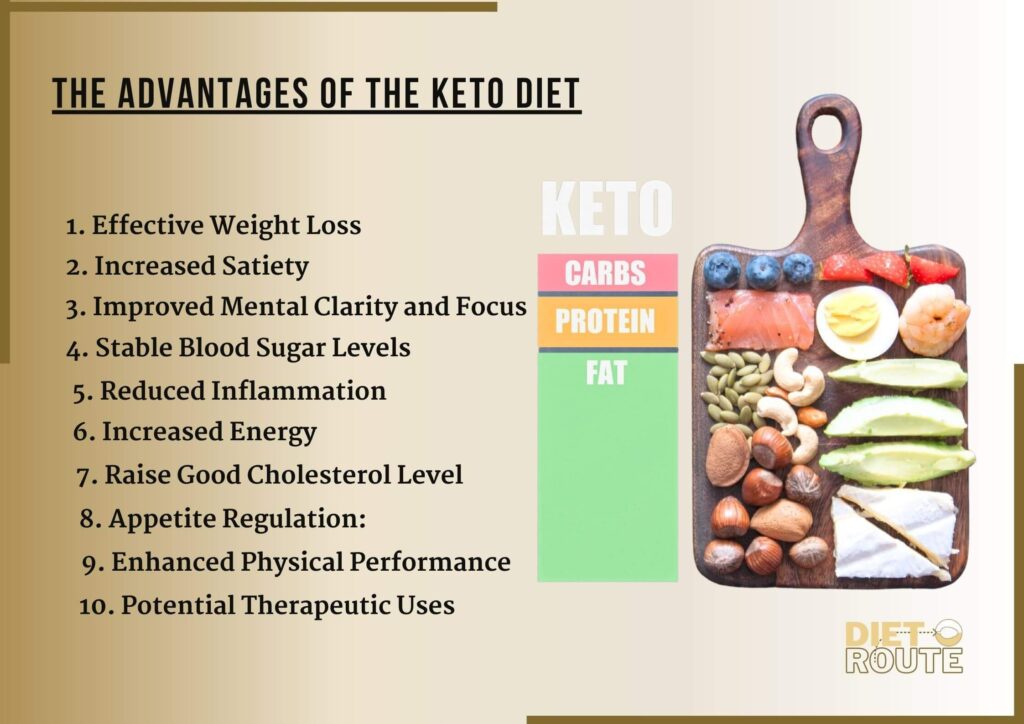
The ketogenic diet has a long list of possible advantages besides weight loss. Here are some of the main benefits you can anticipate from adhering to a properly designed keto diet:
1. Effective Weight Loss:
One of the main reasons individuals choose the keto diet is because of how well it can aid in weight loss. The body reaches a state of ketosis when it efficiently utilises stored fat for energy by consuming fewer carbohydrates and more fat. Long-term weight loss that is significant and sustainable can result from this.
2. Increased Satiety:
The keto diet’s high fat content and sufficient protein intake can make you feel full for longer. By reducing cravings and the desire to overeat, this improved satiety can help you stick to your weight loss goals and sustain a calorie deficit.
3. Improved Mental Clarity and Focus:
Many keto dieters claim that their mental clarity and attention have increased while they are in ketosis. This is due to the fact that ketones give the brain a consistent and effective fuel source, which can lead to improved cognitive performance and higher productivity.
4. Stable Blood Sugar Levels:
The keto diet can aid in controlling blood sugar levels and enhancing insulin sensitivity by reducing carbohydrate intake. For those who have type 2 diabetes or are at risk of getting it, this can be especially helpful.
5. Reduced Inflammation:
Heart disease, diabetes, and some cancers are just a few of the health issues that have been related to chronic inflammation. It has been demonstrated that the ketogenic diet lowers inflammatory indicators in the body, potentially reducing the risk of contracting certain disorders.
6. Increased Energy:
As your body becomes accustomed to using ketones as its main fuel source, you may notice increased energy levels all day long. In contrast to high-carbohydrate diets, which cause energy spikes and crashes, the ketogenic diet offers a constant flow of energy.
7. Raise Good Cholesterol Level:
Contrary to popular belief, the ketogenic diet can have a favourable effect on your cholesterol levels. It has been demonstrated to lower levels of “bad” LDL cholesterol and triglycerides while increasing levels of “good” HDL cholesterol, potentially lowering the risk of heart disease.
8. Appetite Regulation:
Leptin and ghrelin, two hormones involved in regulating hunger, have been discovered to be affected by the keto diet. By establishing regular hunger cues and limiting overeating, this can aid in long-term weight management.
9. Enhanced Physical Performance:
Once fully accustomed to the keto diet, many people report increased endurance and fat adaptation, even if the diet may initially have an adverse effect on athletic performance. Ketosis may enable athletes to access their fat reserves more effectively when exercising, which appeals to endurance athletes.
10. Potential Therapeutic Uses:
The ketogenic diet has demonstrated promise in a number of therapeutic uses, including the treatment of epilepsy, the management of polycystic ovarian syndrome (PCOS), and even as an adjuvant therapy for some cancers. However, before exploring these particular therapeutic uses, it’s crucial to speak with a healthcare provider.
Accepting the ketogenic diet exposes you to a wide range of potential advantages for your physical and mental health. After looking at the benefits, let’s move on to the how-tos of beginning a ketogenic diet.
Getting Started with Keto Diet
To achieve a seamless transition into ketosis while starting a ketogenic diet, prior planning and preparation are essential. To get you started on your keto journey, here are some essential first steps:
1. Set Clear Goals:
Establish definite goals before beginning the keto diet. Having a specific goal can help you stay motivated and concentrated throughout the process, whether it is weight loss, increased energy, or better overall health.
2. Educate Yourself:
Become familiar with the fundamentals of the keto diet. Recognise the food limits, macronutrient ratios, and probable challenges. You’ll be better able to make wise selections if you have more knowledge.
3. Clean Out Your Pantry:
To reduce temptation, remove high-carb foods from your kitchen. Grain, starchy vegetables, sugary snacks, and processed foods should all be eliminated. Instead, stock up on keto-friendly substitutes.
4. Plan Your Meals:
Make a meal plan for the upcoming week by planning your meals. Concentrate on eating meals with low-carb vegetables, moderate protein, and healthy fats. Making a plan will stop you from making poor meal decisions at the last minute.
Dietary Supplements for the Keto Diet
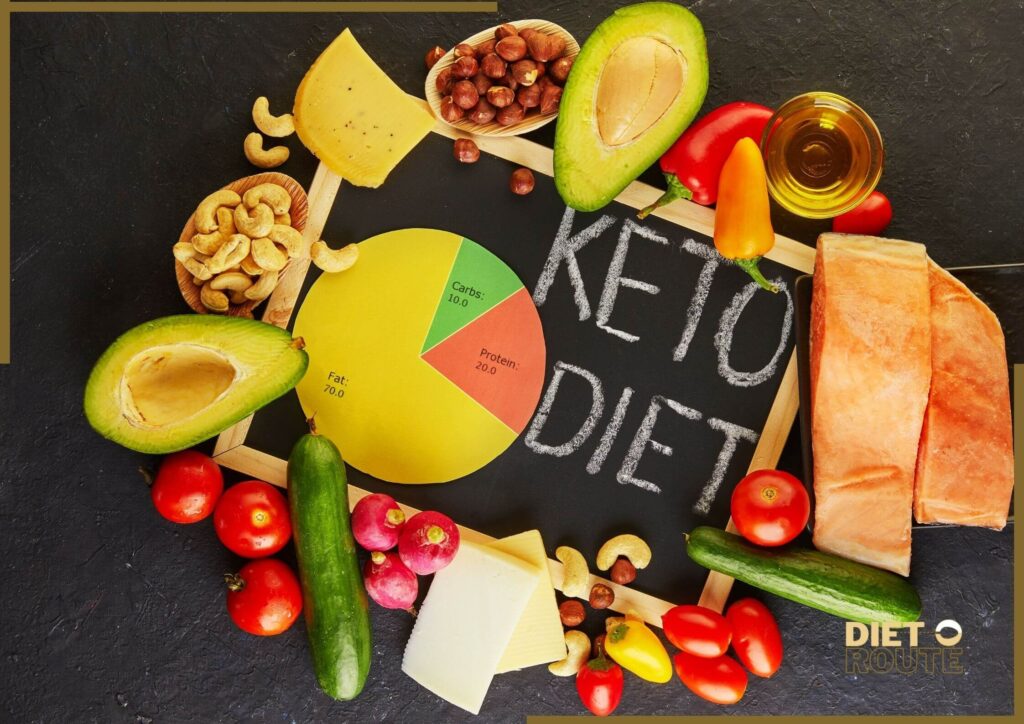
a. Healthy Fats:
Several sources of healthy fats should be present in your diet. Excellent alternatives include avocados, coconut oil, olive oil, nuts and seeds, and grass-fed butter. These fats will give you energy and encourage fullness.
b. High-Quality Protein:
Opt for high-quality, lean protein sources. Choose grass-fed meat, fish, poultry, and eggs. For muscle upkeep and repair, protein is essential.
c. Vegetables Low in Carbohydrates:
Consume a lot of non-starchy vegetables. Leafy greens, broccoli, cauliflower, zucchini, asparagus, and bell peppers are some examples. These vegetables are full of fibre and nutrients.
d. Dairy Products:
Greek yoghurt, cheese, and other full-fat dairy products can be included in a ketogenic diet. However, be aware of how many carbohydrates they contain and eat them in moderation.
e. Nuts and Seeds:
Snack on a range of nuts and seeds, including flaxseeds, chia seeds, almonds, and walnuts. They supply fibre, essential nutrients, and healthy fats.
f. Berries:
Strawberries, raspberries, and blackberries can all be eaten in moderation while following a ketogenic diet. Compared to other fruits, they have a comparatively low carbohydrate content.
g.Drinks:
Stay hydrated by sipping on water frequently throughout the day. Additionally, you can sip on herbal infusions, unsweetened tea, and coffee. Skip the fruit juices and sweetened beverages.
To stay in ketosis, keep track of your macronutrient consumption and modify your portions as necessary. Keeping track of your daily intake can be made easier by using a food diary or smartphone app.
You’ll have a strong foundation for preparing delicious, filling meals that adhere to the guidelines of the ketogenic diet if you have these essential foods in your pantry. We’ll discuss how crucial meal planning and preparation are to your success on the keto diet in the section after this one.
Planning and Preparing Meals
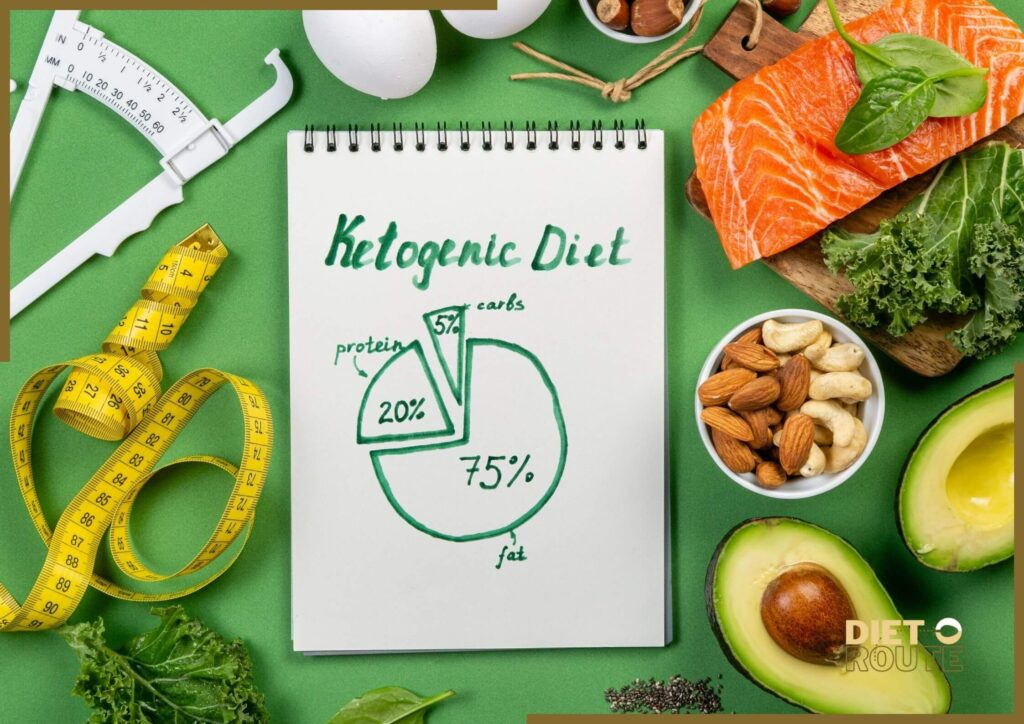
The preparation and planning of meals are essential components of a successful keto journey. Planning your meals and keeping track of your macros and nutrients can help you stay on track with your goals and follow a well-balanced ketogenic diet.
a. Plan Ahead:
Allocate time each week to make a grocery list and plan your meals. When choosing your meals for the week, take into account your schedule, dietary preferences, and nutritional requirements.
b. Balance Macronutrients:
Focus on creating meals that are balanced in terms of macronutrients. Concentrate on including low-carb veggies, a modest amount of protein, and a significant amount of healthy fats.
c. Variety and Flexibility:
To prevent boredom and make sure you’re getting a variety of nutrients, include a variety of foods in your meal plan. Additionally, make room in your strategy for flexibility to account for unforeseen circumstances or adjustments.
d. Batch Cooking:
To save time during the week, think about batch cooking some meals or meal components. Meal assembly can be sped up and made more convenient by preparing large batches of sauces, roasted veggies, or proteins.
Monitoring Macronutrient and Nutrient Levels
a. Understand Your Macros:
Based on your goals, determine the best macronutrient ratios and, if necessary, get advice from a certified dietitian or a healthcare provider. The keto diet often calls for ingesting 70–75% of calories as fat, 20–25% as protein, and 10–15% as carbohydrates.
b. Use a Tracking Tool:
Track your daily consumption of calories and macronutrients using a tracking tool or mobile app. This will guarantee that you sustain ketosis and help you stay within your ideal limits.
c. Monitor Micronutrients:
Track your macros, but don’t forget to keep an eye on your micronutrient intake. Make sure you’re consuming enough fibre, vitamins, and minerals by choosing a variety of keto-friendly foods.
d. Maintain Consistency:
Track your consumption frequently to stay aware of your dietary selections and make any required adjustments. You’ll gradually gain a better understanding of portion sizes and the nutritional makeup of various foods.
e. Be Aware of Hidden Carbohydrates:
Some foods, such as sauces, dressings, and processed meats, may contain hidden carbohydrates. To avoid mistakenly consuming too many carbohydrates, read labels carefully and keep these hidden sources in mind.
You may have a clear understanding of your food choices and make modifications as necessary to stay in ketosis by adding meal planning to your routine and meticulously tracking your macros and nutrients. We’ll discuss how supplements can benefit your keto journey in the following section.
Keto-Friendly Supplements
While a well-planned keto diet can help you meet your nutritional needs, some people may benefit from taking certain supplements to improve their health and make the most of their ketogenic journey. Following the ketogenic diet, many people use the following supplements:
1. Electrolytes:
As your body enters ketosis, you can experience an increase in the excretion of electrolytes, which can cause imbalances and cause symptoms like weariness, headaches, and cramping in your muscles. Electrolyte supplements, such as those containing salt, potassium, and magnesium, can support normal electrolyte balance.
2. Medium-chain triglyceride (MCT):
Medium-chain triglyceride (MCT) oil is a well-liked dietary supplement among followers of the ketogenic diet. As a rapid source of energy, MCTs are simple to convert into ketones. Your ability to burn fat can be improved by including MCT oil in your diet, which will increase ketone generation.
3. Omega-3 Fatty Acids:
Despite the keto diet’s focus on good fats, it’s crucial to get enough omega-3 fatty acids in your diet. Omega-3s promote heart health, lower inflammation, and enhance cognitive function, among many other health advantages. Supplements made from algae or fish oil are excellent sources of omega-3s.
4. Vitamin D:
Vitamin D is essential for the immune system and general health. The keto diet may limit your access to food sources of vitamin D, so taking a supplement can be helpful. To establish the right dosage for your requirements, speak with a healthcare expert.
5. Digestive Enzymes:
When switching to a high-fat diet, some people may have digestive problems. Supplemental digestive enzymes can help with the digestion and absorption of lipids, reducing any discomfort or digestive issues.
As individual needs may differ, it is always advisable to seek advice from a healthcare provider or trained nutritionist before beginning any new supplements.
Overcoming Common Obstacles
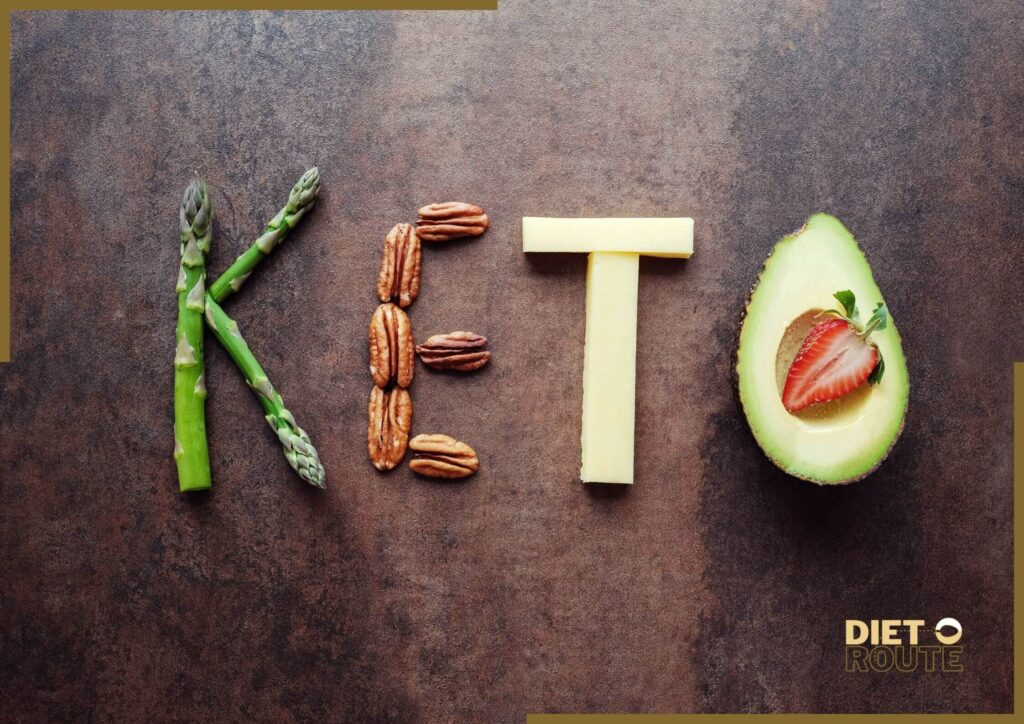
Despite the many advantages of the ketogenic diet, it’s crucial to recognise and handle potential challenges. You can overcome these challenges and keep making progress if you are organised and proactive.
1. Keto Flu:
Some people may experience “keto flu” symptoms while switching to a ketogenic diet for the first time. These symptoms include exhaustion, headaches, irritability, and brain fog. Keep yourself hydrated, refill your electrolytes, and give your body some time to get used to the new diet.
2. Social Pressures and Temptations:
When adhering to a certain diet, eating out or going to social events might provide challenges. Prepare ahead of time by looking into keto-friendly food alternatives, letting others know about your dietary restrictions, or offering to bring a meal to share that is keto-friendly.
3. Food Cravings and Emotional Eating:
For anyone on a diet, emotional eating and cravings can present significant challenges. Look for other methods of stress and emotion management, such as exercising, meditating, or getting help from a therapist or support group.
4. Slow or stable progress:
Over time, weight loss progress may sluggish or stop. This is common, but it may be overcome by reevaluating your calorie intake, altering your macros, embracing intermittent fasting, or attempting new foods and dishes to rekindle your motivation.
Keeping Up Long-Term Success
It’s essential to focus on sustainability and lifestyle adjustments to ensure long-term success with the keto diet. To help you keep making progress, here are some tips:
1. Consistency is Key:
The best long-term results will come from consistently adhering to the fundamentals of the keto diet and leading a healthy lifestyle. Aim for a healthy diet that is diverse and balanced, regular exercise, and enough sleep.
2. Regular Exercise:
Include regular exercise in your routine to help you manage your weight, get healthier overall, and feel better. Make time each week for things you find enjoyable, such as yoga, strength training, or walking.
3. Mindful Eating:
Practise mindful eating by observing your hunger and fullness cues, enjoying your meals, and concentrating on the calibre of your food selections. This could aid in curbing overeating and encouraging a healthy connection with food.
4. Ongoing Education and Support:
Keep abreast of the most recent findings and advice about the keto diet. Join support groups, participate in online forums, consult a qualified dietician, or participate in online communities to stay inspired, get advice, and connect with others.
You may overcome challenges, sustain long-term keto success, and continue to benefit from the ketogenic lifestyle by following these ideas.
In a Nutshell
The ketogenic diet has a wide range of advantages that go beyond weight loss. You can have better mental clarity, stable blood sugar levels, decreased inflammation, more energy, and better physical performance by adhering to a well-designed ketogenic diet.
Additionally, beneficial advantages of the ketogenic diet include improvements in appetite control, cholesterol levels, and even potential therapeutic uses for specific medical disorders.
It’s essential to comprehend the fundamentals of the ketogenic diet and make educated decisions about the foods you eat if you want to start a successful keto journey. Healthy fats, high-quality protein, low-carb veggies, dairy products, nuts and seeds, and, in moderation, berries are all necessary foods for the keto diet.
You can assure a well-balanced and satisfying keto diet through meal planning and preparation.
In order to stay in ketosis and track your success, tracking your macros and nutrients is essential.
To stay on top of your macronutrient consumption and make any modifications, you can use tracking tools or smartphone apps. You can maintain your health and well-being on the keto diet by being aware of hidden carbohydrates and taking supplements like electrolytes, MCT oil, omega-3 fatty acids, and vitamins.
By staying hydrated, getting assistance, and making the necessary adjustments to your strategy, you can overcome typical challenges like the “keto flu,” social demands, emotional eating, and plateaus. Consistency, regular exercise, mindful eating, continued education, and support are all needed for the keto diet to remain successful over the long term.
Key Takeaways
1. A low-carb, high-fat diet called the ketogenic diet encourages ketosis, a metabolic state in which the body uses fat as fuel rather than carbs.
2. Weight loss, enhanced mental acuity, stable blood sugar levels, decreased inflammation, increased energy, and possible medicinal uses are all advantages of the keto diet.
3. Healthy fats, high-quality protein, low-carb veggies, dairy products, nuts and seeds, and, in moderation, berries are all necessary foods for the keto diet.
4. The keto diet requires careful meal planning and preparation to be successful. A varied diet that is well-rounded and fulfilling is achieved by balancing macronutrients and including a variety of foods.
5. Monitoring macros and nutrients enables changes to fit individual demands while assisting in keeping the body in ketosis. On the ketogenic diet, supplements including vitamins, MCT oil, omega-3 fatty acids, and electrolytes can improve overall health.
6. The “keto flu,” peer pressure, emotional eating, and plateaus are typical keto diet challenges. Hydration, assistance from others, and modifying your strategy as necessary will help you get past these obstacles.
7. Consistency, regular exercise, mindful eating, continued education, and support are all necessary for long-term success with the keto diet.
8. It is advised to seek personalised advice from a healthcare provider or trained dietitian to make sure the ketogenic diet is suitable for particular needs.
9. The keto diet is more of a lifestyle adjustment than a quick fix. In order to sustain the intended results, commitment and flexibility are required.
10. Because everyone’s experience with the keto diet will be unique, it’s crucial to pay attention to your body, adjust as needed, and put your overall health first.
FAQs
1. Can I eat fruit while on the ketogenic diet?
Although berries typically contain fewer carbohydrates than fruits, some berries can still be eaten in moderation.
2. Does the ketogenic diet work for everyone?
Not everyone should follow the ketogenic diet, especially if they have certain medical issues or dietary requirements. A healthcare professional should be consulted.
3. On the ketogenic diet, may I have cheat meals?
Cheat meals can thwart progress and disturb ketosis. For best results, it is typically advised to adhere to the diet’s principles.
4. To enter ketosis, how long does it take?
Each person’s time to enter ketosis is different, but generally it takes a few days to a week of adhering to the diet strictly.
5. On a ketogenic diet, can I work out?
The keto diet encourages exercise, which can boost overall health, improve fitness levels, and accelerate weight loss.
6. What can I do to get over the “keto flu”?
Keeping hydrated, replacing electrolytes, and giving your body time to adjust will lessen the effects of the “keto flu.”
7. The keto diet might have some negative effects, right?
Side effects such as constipation, vitamin shortages, or changes in cholesterol levels may occur in some people. These effects can be lessened by keeping an eye on and making changes to your diet.
8. Can I adhere to a vegan or vegetarian keto diet?
A vegetarian or vegan can follow a keto diet, but careful planning is necessary to guarantee appropriate protein and nutritional consumption.
9. On the ketogenic diet, is alcohol permitted?
Alcoholic beverages can prevent ketosis because they typically contain a lot of carbs. On the keto diet, it’s advised to minimise or avoid alcohol.
10. What if my weight loss on the keto diet reaches a stop?
During weight-loss efforts, plateaus are frequent. Breaking past plateaus can be done by embracing intermittent fasting, trying new foods, tweaking macros, or getting professional advice.
